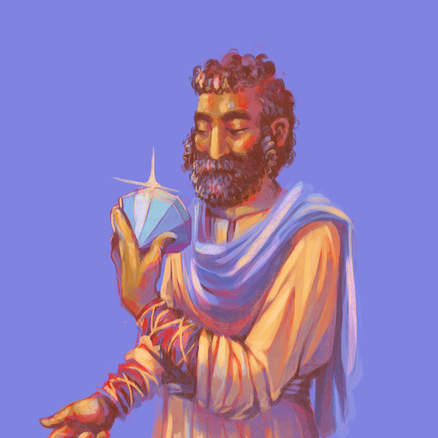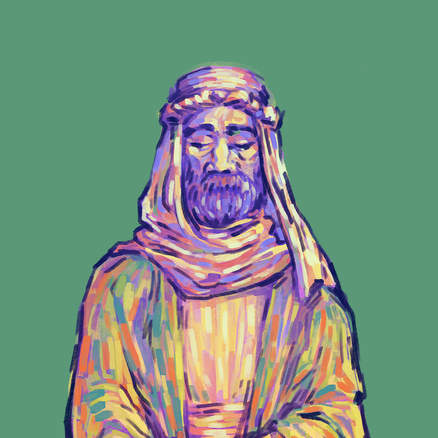
Biblical Law
Why are there so many laws in the Bible? Understanding the biblical law can bring the story of the Bible into clearer focus. Learn more about the law and the prophets in this video.
Script
Introduction [00:00-00:30]
Tim: If you start reading the Bible from the beginning, you’ll get about halfway through the second book, Exodus, and you’ll come to a bunch of ancient laws.
Jon: “Thou shalt do this.” “Thou shalt not do that.”
Tim: Now these laws are all written in the literary style we call prose discourse, and they’re found all over the second, third, fourth, and fifth books of the Bible. There’s over 600 laws.
Jon: And since reading ancient law code isn’t something you and your friends do a lot, odds are you’re going to struggle. So let’s talk about how to read the law in the Bible.
God’s First Command [00:31-01:28]
Tim: So the first thing to remember is that the Bible is not a behavior manual with a complete list of what to do and not to do to make God happy.
Jon: Right. The Bible is an epic narrative. But in the story, God does tell people what to do.
Tim: For sure. The story begins with God’s plan to rule the world through humans who will trust him and live by his wisdom. And here we find the first divine command in the Bible.
Jon: “Don’t eat from the tree of knowing good and evil because the day you do, you’ll die.”
Tim: But the humans take the authority to know and define good and evil for themselves, and it’s not good. It leads to a world of violence and death, and they are exiled from the garden.
Jon: Okay, so this was the first law in the Bible?
Tim: Well, it’s the first divine command, and it invites the people to trust God and live by his wisdom. And so while it’s not part of the laws given to Israel, it does foreshadow them because those too are invitations to trust God’s wisdom.
Jon: So when do the laws of Israel come?
The Laws of Israel [01:29-02:13]
Tim: Okay. Here’s the story. Israel is enslaved in Egypt, so God saves them and then invites them into a covenant relationship, like a marriage. And the laws make up the terms of that covenant.
Jon: And so do we get a catalog of all these laws that God gave Israel?
Tim: Actually no. We don’t get all of the laws, only examples. And these have been strategically placed in between stories about how Israel keeps violating the laws.
Jon: Ah. So I’m supposed to see that Israel is no different than the humans in the garden? They don’t trust God or live by his wisdom.
Tim: Right, and so it leads to another round of tragedy, violence, and death.
Jon: And it ends in exile!
Tim: And so while the laws are good and show God’s wisdom, they also expose Israel’s inability to be God’s faithful partners.
Types of Laws [02:14-05:07]
Jon: I’m following. But when I read the laws, I find a lot of strange stuff, like not allowing clothing to be made of two different fabrics. Like how does that show God’s wisdom?
Tim: Okay, so it’s important to realize that many of these laws are ancient ritual symbols that set Israel apart, that is, made them holy. So some laws made Israel distinct from neighboring nations, while other laws kept them away from things that, in their culture, symbolized death, disease, and moral corruption.
Jon: Okay, but what about all of the ritual killing of animals?
Tim: Sacrifices were also ritual symbols that connected people to God. Since you a mortal can’t ascend up to God’s presence in the heavenly temple, a blameless animal that was offered could go up in your place, covering for your failures, so you can know you’re accepted by God.
Jon: I see. But not all the laws are ancient rituals. Some of them are just about being a good person and treating others well.
Tim: Well yes, but these laws aren’t just about being good. They’re about justice, which is a big deal to God. On the first page of the Bible, we learn that every human is made in God’s image and is worthy of dignity. And these laws applied that ideal in Israel’s day. In fact, these laws still underlie many of the concepts of justice and equality that we take for granted today.
Jon: But some of the laws don’t seem just, like laws that allow for slavery.
Tim: Well if you look at those laws in their ancient cultural context, you’ll see that God’s working with Israel as he finds them, pushing them towards justice. So slavery isn’t abolished, but it is undermined. For example, Israel was supposed to reenact the Exodus liberation by releasing slaves and forgiving all debts every seven years. This was revolutionary in the ancient world.
Jon: Alright. Now what about all the laws about Sabbath rest on the seventh day and all the seven-day feasts? I mean, what’s up with all these sevens?
Tim: Yeah, so these laws about sacred time are all connected to the first creation narrative in Genesis. God brings order out of chaos in six days that each have a clear beginning and end. But when you get to the seventh day, it has no end. That’s because it’s pointing to the ideal of humans partnering with God in his rule and rest. All of these seven-day feasts are rituals that symbolize humanity’s true purpose and future hope.
Jon: Okay, so all of these laws given to Israel can fit into those basic categories?
Tim: Yes. And each category expresses a core ideal of God’s wisdom, and the laws show how those ideals should be applied in the culture of ancient Israel.
Jon: But as the story makes clear, Israel failed at fulfilling the law over and over. How is God going to get humans to trust his wisdom?
Tim: Well Moses and the prophets after him trusted that one day God would transform the human heart, so people can be faithful covenant partners who trust his wisdom. And that brings us to the story of Jesus.
Jesus Fulfills the Law [05:08-06:00]
Jon: Yeah. Jesus said he came to fulfill the law.
Tim: Right. He was the faithful covenant partner that Israel and all humanity was made to be but has failed to be. Jesus lived by the divine ideals underlying the laws, and he taught that the laws are all fulfilled when you love God and love your neighbor as yourself.
Jon: And Jesus promised that God’s Spirit would come and transform his followers so they too could live this way.
Tim: And so when followers of Jesus read these laws today, we need to remember they were given to Israel in their ancient cultural setting. You couldn’t follow many of them even if you tried!
Jon: But what you can do is see God’s wisdom in the laws.
Tim: Right, and trust that God’s Spirit can guide you to follow that wisdom as you learn to love God and to love your neighbor as yourself.
Related Content























